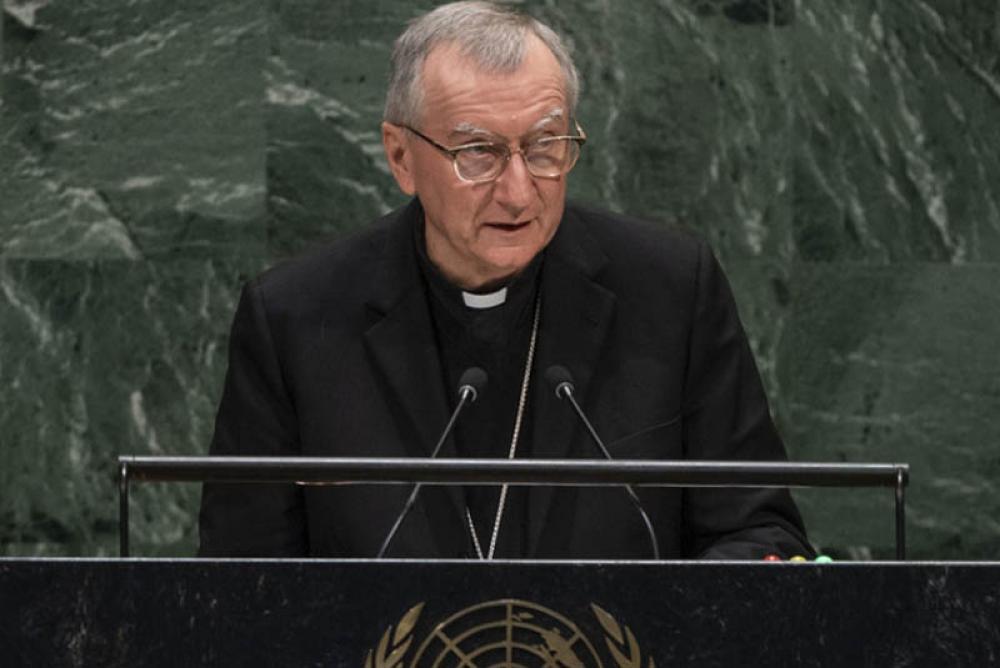Just Earth News | @justearthnews | 29 Sep 2019

New York: As a precondition for addressing so many of today’s greatest challenges, Cardinal Pietro Parolin, State Secretary of the Holy See, told the United Nations on Saturday morning that “galvanizing effective multilateralism” is one of the most important priorities for the international community.
Keenly aware that international relationships are experiencing “particular tension and fragmentation”, he urged UN Member States at the annual general debate to promote “dialogue at every level”, as the antidote to every division.
On behalf of Pope Francis, he told the General Assembly that the international community’s failure to recognize itself as “a family of nations…is at the heart of today’s manifold challenges facing multilateralism”.
Painfully aware of the inadequacies of international cooperation and commitment, Cardinal Parolin urged stepped-up efforts to end immense suffering, including of the people in the Middle East, Syria and Yemen.
Another area of pressing concern involves Venezuela and Nicaragua, where he advocated for “institutional channels” to negotiate solutions to political, social and economic problems, adding that the “recommendations presented by the UN Office of the High Commissioner for Human Rights (UNCHR)” should also be implemented.
Turning to the pursuit of peace and security, the Holy See representative encouraged States to rededicate themselves to protecting women and children from sexual violence during armed conflict; including women in preventive diplomacy, conflict resolution, peacebuilding, humanitarian and other post-conflict processes; and training peacekeepers, national forces and police to better protect them.
Sexual violence is “degrading, dehumanizing and a grave violation” of rights and dignity, he lamented, stressing that its use as a weapon of war is “absolutely unacceptable and must be stopped”.
Drawing attention to the plight of children conceived as a result of sexual violence in war, he called both mothers and children “innocent victims”, saying, “no effort must be spared to ensure their full reintegration into society”.
On weapons proliferation, the Cardinal noted the importance of greater international and regional cooperation, especially among weapon-producing States, warning that otherwise “the cycle of death, destruction and disruption will simply continue”.
“Greater multilateral cooperation is likewise needed to create the conditions and take steps necessary for the elimination of nuclear weapons”, he said, pointing to the relevant treaties as “important steps toward a nuclear weapons-free world”.
And multilateralism is also a key to lifting people out of extreme poverty.
“The 2030 Agenda for Sustainable Development is an unprecedented multilateral commitment to help the more than 731 million people still in extreme poverty not only be freed from that situation of abject deprivation, but continue to rise above the poverty line through addressing the many factors that are necessary for their integral development”, he detailed.
Turning to the climate crisis, the Cardinal underscored the “clear and urgent need” for more determined political will and greater global cooperation to support climate action.
Special attention must be given to the Amazon, where fires have devastated the region, the Congo Basin, Southeast Asian rainforests, as well as national forests and vegetation covers, all whose ecosystems and vast biome are facing “serious threats”, according to Cardinal Parolin.
Finally, he said “the challenges of international migration and forced displacement demand the comprehensive commitment and action of all States”.
Refugees and migrants, who often experience exclusion and suffering in both countries of origin and destination, deserve “a galvanized multilateralism of assistance and inclusion by the international community”, concluded Cardinal Parolin.